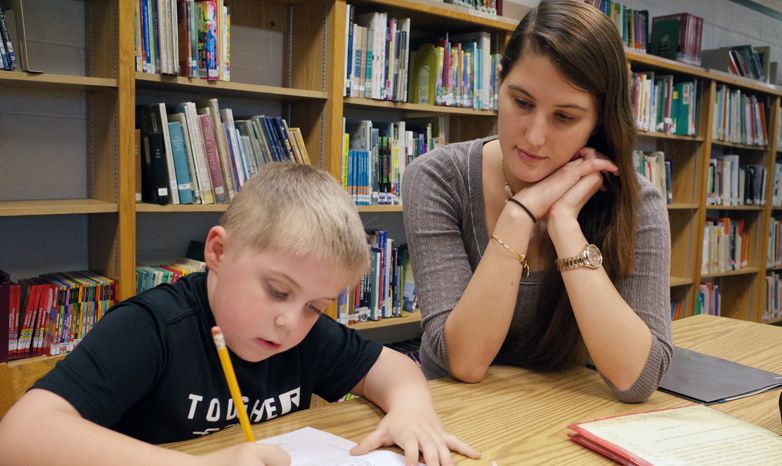Tutoring program helps pupils make the grade

Alicia Stone, an SRU elementary education major from Natrona Heights, works with a student at Slippery Rock Area Elementary School.
April 8, 2016
SLIPPERY ROCK, Pa. - As students walk into their classroom at Slippery Rock Area Elementary School, they often sneak a peak at a poster urging them to "Shoot for the moon. Even if you miss, you'll land among the stars."
Helping them to reach their potential are 51 Slippery Rock University elementary education and special education majors. SRU offers a partnership-tutoring program with the school that provides children with one-on-one, afterschool lessons and SRU teacher candidates with valuable classroom experience.
Students tutor twice a week. Serving as a mentor and coach to their "tutees," they are eager to help them make learning connections and improve basic skills in reading, writing and mathematics.
"It is honestly so cool to witness that 'click' moment in a student," said Karlee Coppersmith, an elementary and special education major from Erie. "A few weeks ago, I was working on perimeter with my student. She was doing a math worksheet for homework and was stuck on a particular problem. She had to draw a shape that counted 11 units on the graph paper."
Coppersmith said all of the previous problems involved even numbers, so this one was a little trickier.
"She kept saying things like 'I give up,' and 'this won't work.' I calmed her down, told her that it can be done, and that she could do it," Coppersmith said. "I reminded her that each line on the graph paper represented a unit. We just had to think outside of the box a little bit. After a few tries, she drew the odd shape all on her own and understood how she got to that point."
Teacher education students enrolled in the course "Curriculum Integration" work with their assigned learner on Tuesday and Thursday afternoons. They help them with punctuation, reading, writing, mathematics, capitalization and homework. Students gain teaching experience, network with teachers and collaborate with the children's parents to maximize the learning experience.
Keith Dils, dean of the College of Education, said research indicates targeted teaching has been shown to help students make marked gains.
"Once placed with the student, our teacher candidates analyze their student's actual performance and assessment data, diagnose problem areas, plan lessons geared to improving those problem areas, teach the lesson and then get feedback," Dils said.
Coppersmith said the tutoring program has opened her eyes to how much students can grow when they are given that type of individual attention. "Creating activities and thinking of ways to help my student has made me think outside of the box and dig deeper", she said. "Though we have had our challenging days, I would not switch this experience for anything or anyone else. My student is a kind and hilarious young girl, and I am so glad that I had the opportunity to work with her. She has made me a better teacher by teaching me how to be more patient and flexible."
Leading the program and teaching "Curriculum Integration" is Carmine DeCarlo, professor of elementary/early childhood education. Pupils meet their tutors in the foyer and walk with them to the library or a classroom for instruction.
"It is one of those rare situations where it truly is a win, win, win, win, win, all the way down the line," DeCarlo said. "The children win, the teacher candidates win, the parents win and the district wins. It's amazing."
DeCarlo said she and Herb Basham, school principal, match up the SRU teacher candidates with children who have similar interests, learning styles and personalities. "Many factors go into the decisions that partner the teacher candidate with their assigned learner. We use data that we glean from interest surveys to predict the successful pairings."
Marissa Dicarolis, an elementary education major from New Kensington, said she plans educational activities with a fun twist to help her students in subjects they find difficult.
"One week I may want to focus on their new math chapter, and then the next reading comprehension and so on," she said. "I take what I see during our time together and use that to develop lessons accommodating their needs."
She said another priority is to help children finish their homework, so they can have quality time with their family at night.
"Working on homework gives me one-on-one time with a student and allows me to address his or her individual needs," Dicarolis said. "It is so critical for teachers to be able to see/understand their students' needs and to find a way to help to create the best version of themselves."
Dicarolis said she bonds with her student through small talk.
"Growing up with four brothers myself, I've always watched the classic boy movies such as 'Star Wars,' which my student loves," she said. "So we talk about the movies and I've even made some lessons for him around that theme, which gets him excited about learning."
SRU plans to continue the tutoring program next semester, with the added step of gaining access to the district's online math and reading curriculum to help tutors plan lessons more effectively.
"This group of teacher candidates is exceptional," DeCarlo said of her students. "They write a lesson plan every day. It's not a pretend lesson. They actually teach. A lot of times, our teacher-educator students become really attached to their students. Sometimes I see them hugging them upon their daily greeting, and likewise again at departure. They really love the kids."
MEDIA CONTACT: Gordon Ovenshine | 724.738.4854 | gordon.ovenshine@sru.edu

